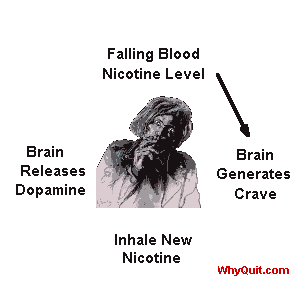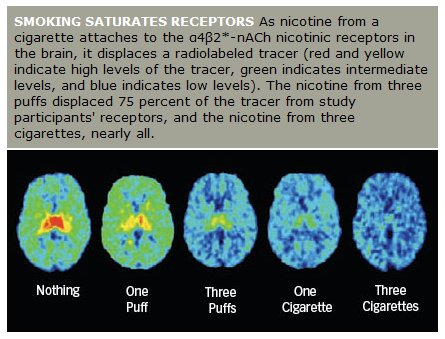
Ignorance Killing Millions of Smokers
May 18, 2012 John R. Polito
Ignorance is a harsh word. But imagine reaching for that next cigarette until it kills you, without ever really understanding why. Imagine wanting to stop yet not knowing the only rule needed to succeed. And imagine never once investigating the truth as to how most ex-smokers quit.
 Half of adult smokers smoke themselves to death. More than five
million smoking deaths annually, with one
billion expected by century's end, why don't smokers take their
self-destruction and slow suicide more seriously?
Half of adult smokers smoke themselves to death. More than five
million smoking deaths annually, with one
billion expected by century's end, why don't smokers take their
self-destruction and slow suicide more seriously?
If the U.S. Centers for Disease Control is correct and smoking causes "1 in every 5 deaths" and "on average, adults who smoke cigarettes die 14 years earlier than nonsmokers," what force could cause one billion humans to each trade 5,000 sunrises for smoke?
Sadly, smoking's biggest killer isn't lung cancer, emphysema, heart attack or stroke. It's ignorance, ignorance about why smokers smoke and how to quit.
Smoking Ignorance
Chemical dependency upon smoking nicotine is as real and permanent as alcoholism. A true mental illness, nicotine enslaves the same brain dopamine pathways as illegal drugs. It is a brain "wanting" disorder which leaves the addict convinced that smoking nicotine is as core to survival as eating food or drinking water.
Brain dopamine pathways are designed to make pre-programmed human survival events nearly impossible, in the short term, to forget or ignore. It's why starving yourself to death is almost unthinkable. It's also why, to the hooked smoker, thoughts of never smoking another cigarette may be as unthinkable as quitting food.
By happenstance, within 8-10 seconds of inhaling just one puff, nicotine arrives in the brain where the nicotine molecule is so similar to the brain's acetylcholine molecule that it is able to activate up to 50 percent of brain dopamine pathway receptors. Additional puffs saturate receptors.

Almost instantly, the smoker feels an “aaah” wanting relief sensation, the same "aaah" relief sensation felt when drinking a cool glass of water when thirsty, or when eating food when hungry.
The smoker's dopamine pathways also generate a high definition memory of how wanting was satisfied. Collectively, the tease and lure of thousands of old wanting satisfaction memories act as the bars to their prison cell, making forgetting how wanting gets satisfied as difficult as forgetting that eating satisfies hunger.
But the nicotine addict's prison bars are an illusion. In fact, there are no bars and there is no penalty for escape, at least not once beyond withdrawal. Truth is, without food we die, while without nicotine we thrive. Truth is, freedom is our birthright and coming home is wonderful not bad.
Quitting Ignorance
Treating addiction to smoking nicotine as though simply a habit which can be modified, manipulated or controlled is a recipe for death. It's why journalists teaching children that smoking is just a "habit" should have their keyboards taken away.
Understanding and accepting that just one puff of nicotine will again high-jack the mind's priorities teacher makes quitting's rules simple. Notice, I didn't say easy, I said simple.
In fact, there's only one rule. It's that one equals all, that lapse equals relapse, that one puff of nicotine will always be too many, while thousands never enough.
Joel's "I want one" video
It's called the "Law of Addiction" and it states: "administration of a drug to an addict will cause re-establishment of chemical dependence upon the addictive substance."
Once established, we cannot kill or cure a true chemical addiction. We can only arrest it. While most who try cheating after quitting walk away feeling like they have gotten away with it, it isn't long before they find their awakened dependency again wanting or begging for more.
It isn't a matter of weakness or a lack of willpower. It's about the design and purpose of brain dopamine pathways, to make events which activate this circuitry extremely difficult to forget or ignore.
Joel's quitting fears videos
Most anxiety felt when quitting is self-induced by a host of irrational fears. For example, why fear a temporary journey of re-adjustment which transports you to entire days where you never once think about wanting to introduce nicotine back into your bloodstream?
Why fear a less than 5 minute crave episode that comes with a giant reward at the end, silencing of another nicotine use cue and the return of a time, place, emotion, person, or activity during which you trained your subconscious mind to expect more nicotine? Navigating crave episodes is good not bad as it's how we reclaim all the pieces and parts of a nicotine-free life.
Joel's "I'll be a nervous wreck forever if I quit smoking" video
Why fear the calm and quiet mind which arrives once addiction's daily chatter ends? Why tease and torment yourself with the thought of smoking just one, just once, when for a drug addict there is no such thing as just one?
Yes, there's just one recovery rule which if followed provides a 100 percent guarantee of success: no nicotine just one hour, challenge and day at a time, to never take another puff.
Quitting Method Ignorance
So, how do most ex-smokers quit? And which quitting method is most effective? Although two different questions the answer is the same: cold turkey.
Truth is, more smokers stop smoking cold turkey each year than by all other quitting methods combined.
While approved quitting products clobber users of inert placebo look-a-like products inside clinical trials, they get clobbered just as badly by cold turkey quitters in real world use (see Doran 2006).
You see, placebo isn't a real quitting method and clinical trials were not blind as claimed. We've been shammed for more than 3 decades, and the FDA knew or should have known since at least June 22, 1983.
A host of recent population level studies have shown that replacement nicotine products simply do not work. Using replacement nicotine to try and wean yourself off of nicotine makes as much sense as giving replacement alcohol to alcoholics.
Common sense tells us that it's impossible for brain dopamine pathways to adjust to functioning without nicotine while replacement nicotine continues to arrive.
And before risking your life using varenicline (Chantix or Champix), has varenicline proven more effective than replacement nicotine? No.
Only two clinical studies have pitted varenicline against replacement nicotine, Aubin 2008 and Tsukahara 2010. In both, varenicline failed to show statistical significance over nicotine patch when assessing the percentage of users within each group who were not smoking at 6 months.
Out here in the real world cold turkey remains king. It's free, fast (nicotine-clean within 72 hours), safe, effective and highly productive.
Knowledge is power. What happens once we become smarter than our addiction is strong? What happens to quitting anxieties when no longer afraid? What do you have to lose by giving your most potent weapon of all - your intelligence - a try?
Freedom is your birthright. Quit for real this time. Go the distance and join us here on Easy Street. There's just one rule to arriving ... no nicotine, not one puff. Yes you can!

